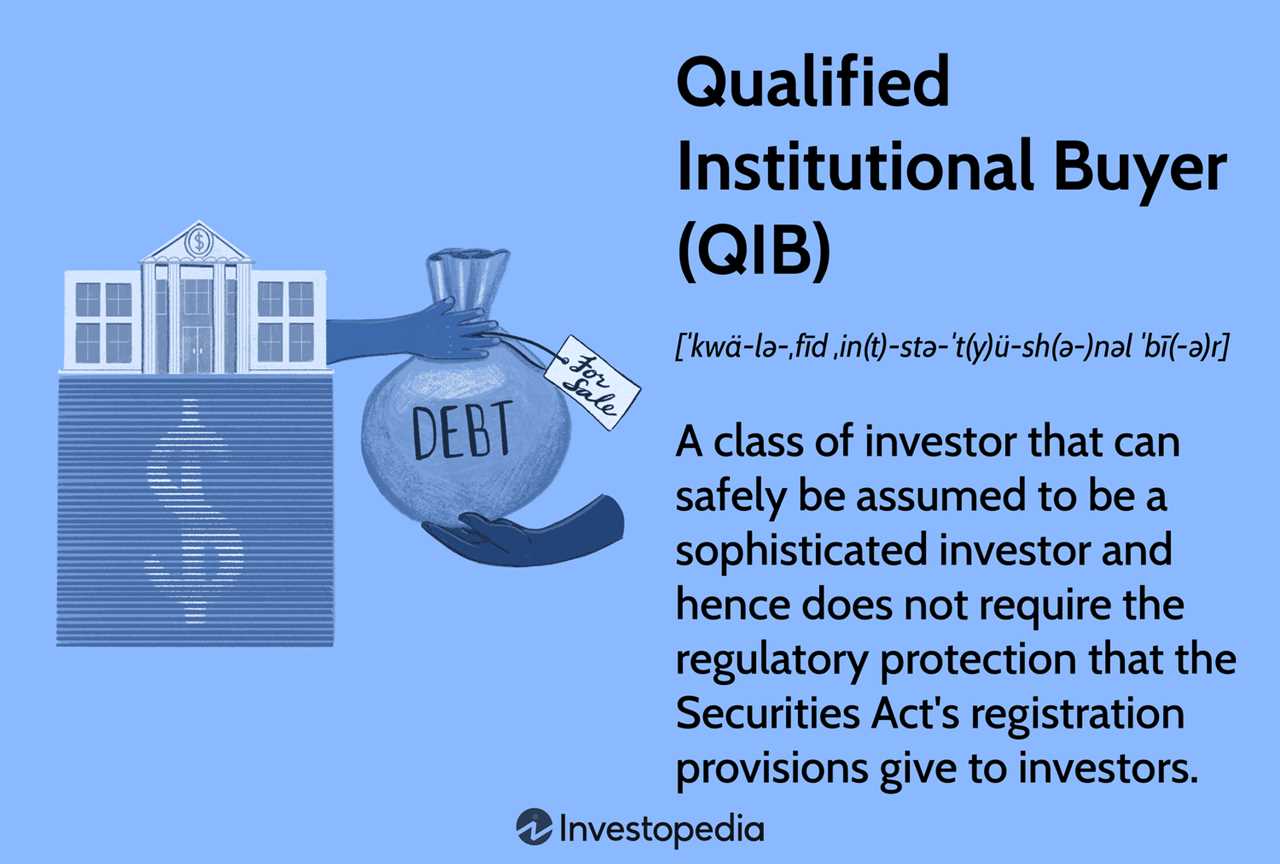Qualified Institutional Placement: Definition and Rules
A Qualified Institutional Placement (QIP) is a method of raising funds by a listed company in India through the issue of securities to qualified institutional buyers (QIBs). QIPs provide an avenue for companies to raise capital without having to go through the lengthy process of a public offering.
QIBs are institutional investors who are registered with the Securities and Exchange Board of India (SEBI) and meet certain criteria, such as mutual funds, insurance companies, pension funds, and foreign institutional investors. These investors are considered to have the necessary expertise and financial resources to evaluate and invest in securities.
The rules for Qualified Institutional Placement are set by SEBI and are aimed at protecting the interests of investors and ensuring transparency in the capital market. Some of the key rules include:
- The minimum issue size for a QIP is INR 100 crore.
- The maximum number of allottees in a QIP cannot exceed 49.
- The minimum allotment to a single QIB cannot be less than INR 5 crore.
- The pricing of the securities issued through a QIP should be determined through a book-building process.
- The company should make certain disclosures and comply with reporting requirements as specified by SEBI.
Qualified Institutional Placement offers several benefits to companies. Firstly, it provides a quicker and more efficient way to raise capital compared to a public offering. Secondly, it allows companies to tap into the expertise and financial resources of institutional investors. Thirdly, it helps in diluting the shareholding of existing promoters and enhancing the liquidity of the company’s shares in the market.
What is Qualified Institutional Placement?
Qualified Institutional Placement (QIP) is a method through which listed companies in India can raise funds by issuing securities to qualified institutional buyers (QIBs). QIBs include mutual funds, insurance companies, banks, and other financial institutions that are registered with the Securities and Exchange Board of India (SEBI).
QIP allows companies to raise capital without going through the traditional route of public offerings. It provides a faster and more efficient way for companies to raise funds from institutional investors. The funds raised through QIP can be used for various purposes such as debt repayment, working capital requirements, expansion plans, and acquisitions.
Process of Qualified Institutional Placement
The process of QIP involves several steps:
- The lead manager prepares the placement document, which includes details about the company, its financials, and the securities being offered.
- The lead manager then approaches potential QIBs and invites them to participate in the QIP.
- Interested QIBs submit their bids for the securities, specifying the quantity and price at which they are willing to purchase.
- The lead manager evaluates the bids and determines the final price at which the securities will be allotted to the QIBs.
- Once the price is finalized, the company issues the securities to the QIBs and receives the funds.
Advantages of Qualified Institutional Placement
QIP offers several advantages to both companies and investors:
- Quick and efficient fundraising: QIP allows companies to raise funds quickly and efficiently without the need for extensive regulatory approvals and public offerings.
- Cost-effective: QIP is a cost-effective method of raising capital compared to other methods such as initial public offerings (IPOs).
- Flexibility in pricing: Companies have the flexibility to determine the price at which they want to issue the securities based on market conditions and investor demand.
- Access to institutional investors: QIP provides companies with access to a wide range of institutional investors who are willing to invest in the company’s securities.
Overall, Qualified Institutional Placement is an effective method for listed companies in India to raise funds from institutional investors in a timely and cost-effective manner.
Rules for Qualified Institutional Placement
A Qualified Institutional Placement (QIP) is subject to certain rules and regulations that govern its conduct. These rules are put in place to ensure transparency, fairness, and investor protection. Here are some of the key rules for Qualified Institutional Placement:
1. Eligibility Criteria:
Only qualified institutional buyers (QIBs) are eligible to participate in a QIP. QIBs include mutual funds, insurance companies, pension funds, banks, and other financial institutions. The Securities and Exchange Board of India (SEBI) sets the eligibility criteria for QIBs.
2. Pricing Guidelines:
The pricing of shares in a QIP must be determined based on market conditions and prevailing regulations. The price cannot be lower than the average of the weekly high and low of the closing prices of the shares on the stock exchange during the two weeks preceding the relevant date.
3. Minimum Issue Size:
SEBI has set a minimum issue size for QIPs to ensure that they are of a certain size and have a wider investor base. The minimum issue size is determined based on the market capitalization of the company and is subject to change from time to time.
4. Lock-in Period:
Shares issued through a QIP are subject to a lock-in period, during which the shareholders are not allowed to sell or transfer their shares. The lock-in period is typically one year from the date of allotment, but it may vary depending on the regulations and the specific circumstances of the QIP.
5. Disclosure Requirements:
Companies undertaking a QIP are required to make certain disclosures to the stock exchanges and the public. These disclosures include information about the company’s financials, business operations, risk factors, and any other material information that may have an impact on the investment decision of the investors.
6. Compliance with SEBI Regulations:
A QIP must comply with all the regulations and guidelines issued by SEBI regarding the conduct of QIPs. Non-compliance with these regulations can result in penalties and other legal consequences for the company and its promoters.
By adhering to these rules, a company can ensure that its Qualified Institutional Placement is conducted in a fair and transparent manner, protecting the interests of both the company and the investors.
Benefits of Qualified Institutional Placement
A Qualified Institutional Placement (QIP) offers several benefits to both the issuing company and the institutional investors involved. These benefits include:
1. Capital raising

One of the main advantages of a QIP is that it allows companies to raise capital quickly and efficiently. By issuing securities to institutional investors, companies can access a large pool of funds without the need for a public offering. This can be especially beneficial for companies that require immediate funds for expansion, acquisitions, or debt repayment.
2. Lower costs
Compared to a public offering, a QIP can be a cost-effective way for companies to raise capital. The expenses associated with a public offering, such as underwriting fees, legal fees, and marketing costs, can be significantly higher. With a QIP, companies can avoid these expenses and allocate more of the raised capital towards their business operations.
3. Flexibility
QIPs offer companies greater flexibility in terms of pricing and timing. Unlike a public offering, where the price is determined through a book-building process, companies can negotiate the price directly with institutional investors in a QIP. This allows companies to set a price that reflects the current market conditions and their own valuation.
4. Limited dilution
By issuing securities to institutional investors, companies can limit the dilution of existing shareholders. Since the shares are sold to a select group of investors, the impact on the ownership structure is minimal compared to a public offering. This can be particularly important for founders and existing shareholders who want to maintain control of the company.
5. Confidentiality

Unlike a public offering, which requires extensive disclosure of financial information, a QIP offers companies greater confidentiality. The information shared with institutional investors is typically limited to what is necessary for them to make an informed investment decision. This can be advantageous for companies that want to keep their financials private or avoid potential competitors gaining access to sensitive information.

Emily Bibb simplifies finance through bestselling books and articles, bridging complex concepts for everyday understanding. Engaging audiences via social media, she shares insights for financial success. Active in seminars and philanthropy, Bibb aims to create a more financially informed society, driven by her passion for empowering others.
